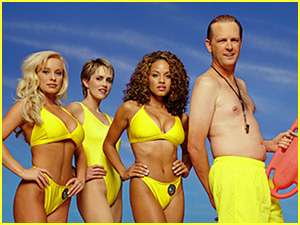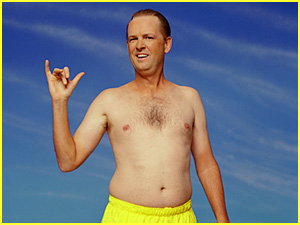 Another Stereotype of the Month entry—an expanded version of my Indian Comics Irregular essay Howard Stern, Son of a Beach:
Another Stereotype of the Month entry—an expanded version of my Indian Comics Irregular essay Howard Stern, Son of a Beach: Another Stereotype of the Month entry—an expanded version of my Indian Comics Irregular essay Howard Stern, Son of a Beach:
Another Stereotype of the Month entry—an expanded version of my Indian Comics Irregular essay Howard Stern, Son of a Beach:
On April 4, 2000, Howard Stern's half-hour cable show, Son of the Beach, went where no show dares to go. It presented an episode called "Love, Native-American Style" laced with almost every Native stereotype imaginable. These included "classic" stereotypes such as
Smoke signals
War drums
"Funny" Indian names
A scantily-clad maiden
Feather bonnets
Buckskins
War paint
Dancing in a circle
Teepees
Tomahawks
as well as more recent stereotypes such as junk-strewn land and an Indian crying at the ruination of nature.
Deconstructing the episode
The plot revolves around a band of Indians living near the show's Malibu setting. After giving their land to a greedy casino developer, the Indians realize they've made a mistake. They learn their connection to the land is more important than short-term profits.
When analyzing Stern's schtick, one must take his alleged aims into consideration. He claims to satirize everyone, to point out their foibles and flaws, without regard for their race or religion. In his mind, he's overturning politically correct idols.
In this case, I suspect he'd say he's satirizing the stereotypes themselves and the ignorant people who believe them. This is different from satirizing the Native people who are commonly stereotyped. By presenting the stereotypes and inviting our laughter, he can show us, in theory, how ridiculous these stereotypes are.
Some evidence for this claim exists. The stereotyping isn't as pervasive or mean-spirited as it could've been. Consider:
A couple of examples suggest Stern is attempting to satirize the stereotypes. At one point Notch Johnson, the protagonist, cries like Iron Eyes Cody in the famous ad campaign, and the tears keep dripping until his leg is soaked. This is a clear riff on the excesses of that campaign.
And although the Native woman wears a buckskin bikini for much of the episode, she's not a helpless bimbo. She's perhaps the most resolute character, the one willing to fight, and she switches to a dress when she meets the developer. It seems Stern is mocking our expectations: that Indian "maidens" are sexy, demure, and weak.

Stereotypes obvious and subtle
That's the upside, such as it is. Now let's examine the downside.
Do the "funny" names, buckskins, and feather bonnets satirize the white man's expectations of Indians or the Indians themselves? The latter, it seems. There's a difference between the San Diego disc jockey who held a contest giving people "funny Indian names" and characters identifying themselves by "funny Indian names." When Native people sport monickers such as "Dark Horse," "Laughing Cow," and "Fire Bush," Stern is making fun of genuine cultural conventions.
Some viewers may conclude Stern is just exercising his tasteless sense of humor, and so what? But some viewers—too many, probably—will conclude Dark Horse and Fire Bush are the kind of names Indians really have. That viewers may not know the difference between the stereotyping and the reality is the danger of this episode.
The episode also suffers from more subtle problems. Among them:
All the Natives are ready to sell out except one. This ignores the complexity of real-world issues. In reality, Indian communities, like other communities, are divided into factions that support or oppose development.
The Indian woman's plan to stab the developer in the back is an immature, childlike solution. It denies that Native people can solve problems in sophisticated ways. Because they must resort to force while Anglos can lobby, negotiate, or sue in court, they come across as inferior.
Perhaps worst of all is using a white man, supposedly adopted by the Indians, as the tribe's voice of reason. This follows a long tradition of requiring an Anglo-Saxon hero to give the audience someone to identify with—what we might call the Kevin Costner syndrome. It implies minority characters need paternalistic, outside help. And worse, that "they" aren't quite human—that they need pale faces before "we" can relate to them.
In reality, people have no problem identifying with minorities if given the chance. Who doesn't want to be like Mike (Michael Jordan), Tiger Woods, Oprah Winfrey, Sammy Sosa, Mariah Carey, Ricky Martin, or Jennifer Lopez? If Native people were given as much opportunity in our popular culture, they could be as popular.
The episode's epilogue shows a brief montage of stereotypical Indian portrayals from old movies. Notch Johnson, the "adopted Indian" narrator, lapses into Tonto talk, ending with the exhortation "No drink'um firewater." Again, this straddles the fine line between satirizing or raising awareness of stereotypes and using or reinforcing those stereotypes. Some viewers will understand the difference and some won't.
But perhaps we're taking too nuanced a look at Son of the Beach. Perhaps we're giving Stern too much credit. Do his intentions even matter if the average viewer doesn't realize them?
One Native woman who saw the show said, "It was disgusting how he portrayed the Indians. It made me sick." That has to be the bottom line. If people don't "get" that Stern is making fun of the stereotypes—if indeed he is—his efforts are a waste of time. Hurting people intentionally is rarely justified, and this isn't one of those occasions.

More offensive stereotypes
While one can argue about the Native stereotypes, we shouldn't ignore the other stereotypes. Stern portrays the women lifeguards as giggling, jiggling, wiggling bimbos. Their idea of fun is a lingerie party where they can dance in scanty outfits.
Kimberlee, the one woman with sense, is castigated as a square and a prude by the others. Naturally, she's less curvaceous, wears a one-piece bathing suit, and has short hair, making her the plain Jane of the crowd. To Stern, sex appeal = personality.
But being a woman means Kimberlee isn't too sensible. When another lifeguard runs out of money, she comes to the rescue with a plan. The female lifeguards will raise money by...stripping for an audience. And Kimberlee finally joins the others in exposing her breasts, proving all women are sex objects after all.
Equally objectionable is Stern's portrayal of a homosexual Indian character as effeminate and interested only in sex. Unlike Stern's use of Native stereotypes, this gay stereotyping is completely gratuitous. It has no purpose or place in a story about Indians.
These stereotypes say a lot more about Stern than they do about their intended targets. Stern seems to have a problem with both women and gays. Perhaps that's why he and his wife of many years have separated.
Incidentally, viewership for Son of the Beach declined 19% for the second episode, another 6% for the third episode, and a whopping 30% for "Love, Native-American Style." Too bad, Howie. Since your cable show is failing just like your marriage, let's hope you find something to occupy you in your declining years.
Addendum (3/14/01)
Son of the Beach did well enough to get renewed for another season, darn it. Expect more knee-slapping "humor" such as an Asian character named Rucy Riu (instead of Lucy Liu...get it?). The ugly stereotyping of women and minorities continues.
Related links
"Funny" Indian names
Tonto talk
"It's just a [fill in the blank]"
Equal opportunity offenders
Why ethnic humor usually doesn't work
Stereotype of the Month contest
Readers respond
"Why would you need a scholarly dissertation to determine that Stern is a talentless fool?"
"You IMBECILE. It's a JOKE."
"The writers are...doing a lot more to poke fun at stereotypes than to continue them."
"We seem to have decided that ANY stereotype is bad."
"You could care less...you just want to trash Stern."
"Shouldn't you be directing your righteous indignation" at the writers?
What about Jay Leno's satirizing the crying Indian?
"Howard makes EVERYONE look silly and childish."
"Stern seems to be the original Equal Opportunity Offender."
No list of topics should be off-limits in fiction.
"The items you mention above are legitimate."
|
. . . |

|
All material © copyright its original owners, except where noted.
Original text and pictures © copyright 2007 by Robert Schmidt.
Copyrighted material is posted under the Fair Use provision of the Copyright Act,
which allows copying for nonprofit educational uses including criticism and commentary.
Comments sent to the publisher become the property of Blue Corn Comics
and may be used in other postings without permission.